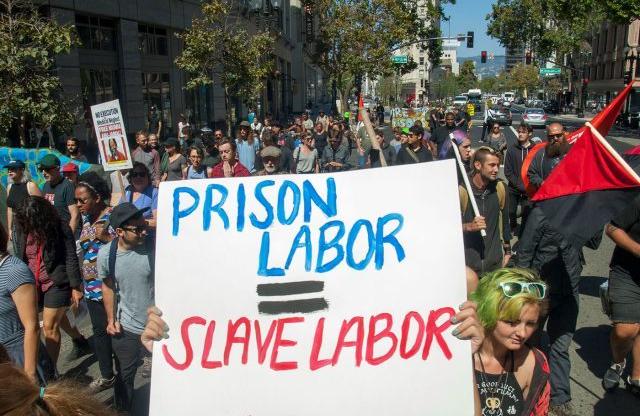Prison Labor - 21st Century Slavery
Available data indicates the national average wage for prisoners is around 63 cents per hour.

Passed by Congress on January 31, 1865, and ratified on December 6, 1865, the 13th amendment effectively abolished slavery in the United States, However, it contained one important caveat that still applies to a segment of the US population - prisoners.
"Neither slavery nor involuntary servitude, except as a punishment for crime whereof the party shall have been duly convicted, shall exist within the United States, or any place subject to their jurisdiction."
Approximately 60% of prisoners work while incarcerated, and according to available data, wages range from 14 cents to $2.00/hour for prison maintenance labor, depending on the state where the inmate is incarcerated. For prison maintenance jobs, inmates can earn $2 per hour in Minnesota and New Jersey. The national average hovers around 63 cents per hour for this type of labor. In some states, prisoners work for free: Alabama, Arkansas, Florida, Georgia, Mississippi, Oklahoma, South Carolina, and Texas. Though not paid a wage for their work, prisoners in these states will still choose to work in order to curry favor with authorities and parole committees.
Even when inmates can work higher-paying jobs, part of their wages can be taken by the prison to pay for their room and board, court costs or other fees. In Massachusetts, half of an inmate’s wages go to pay for expenses after release, and in New Mexico, 15-50% goes to a Crime Victims Reparations Fund, discharge money and family support. Wages for inmates are even lower when you consider the number of fees charged and the cost of necessary items sold to people in prison. A female inmate in Colorado has to spend two weeks of wages just to buy one box of tampons; a Pennsylvania inmate will need to spend almost two weeks of wages on a $10 phone card.
Recently, Arizona Department of Corrections Director David Shinn said Arizona communities would “collapse” without cheap prison labor, during testimony before an Arizona legislative community discussing a proposal for a contract to run a prison in Florence, Arizona.
"There are services that this department provides to city, county, local jurisdictions, that simply can't be quantified at a rate that most jurisdictions could ever afford. If you were to remove these folks from that equation, things would collapse in many of your counties, for your constituents."
Considering the US prison population has increased by over 500% in 40 years, the United States benefits from, by far, the largest population of slave labor in the world.










